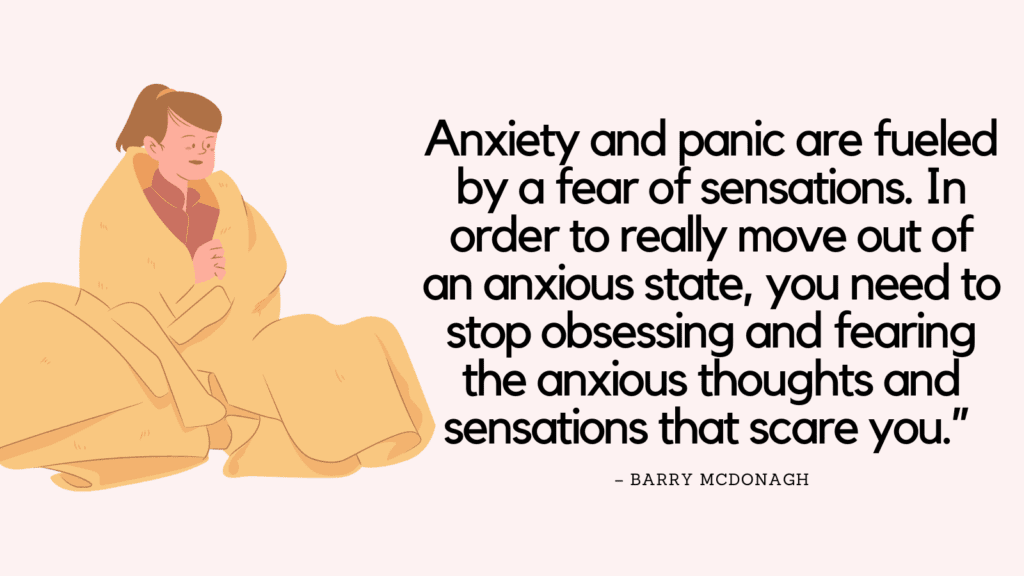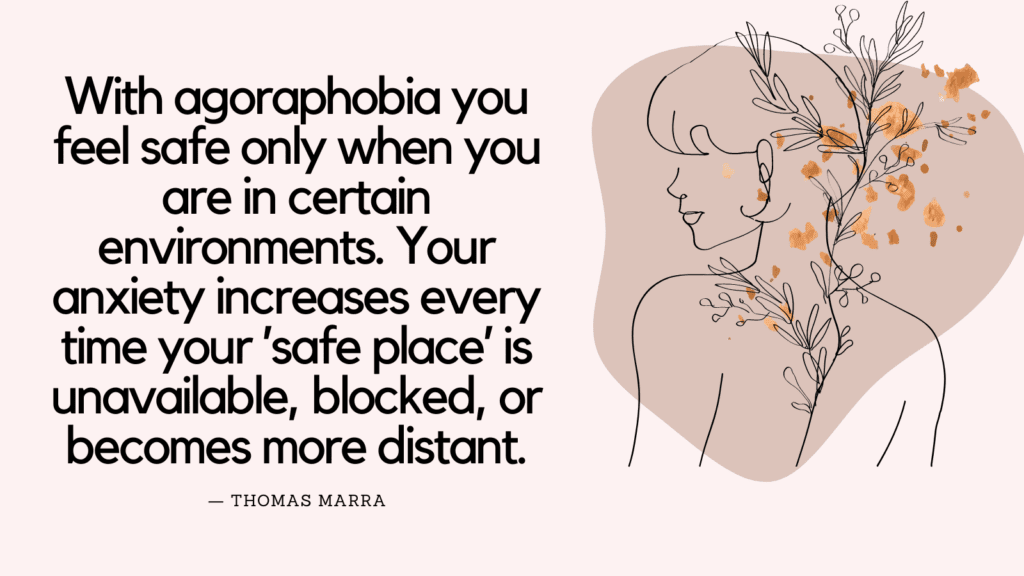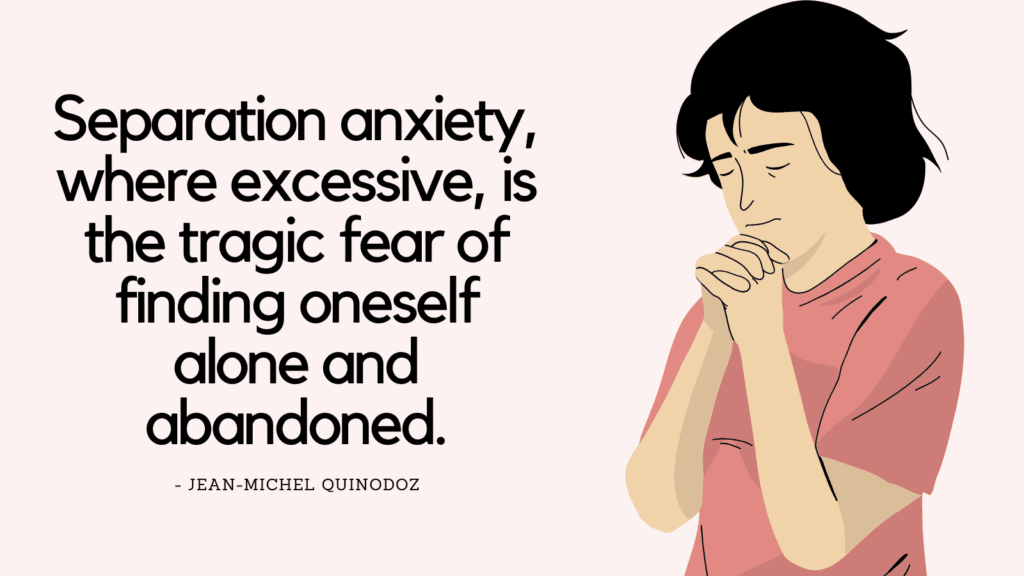This post contains some of the best panic quotes.
What Is Panic attack?
The Diagnostic and Statistical Manual of Mental Disorders, Fifth Edition, Text Revision (DSM-5-TR) is the standard reference that therapists of all specialties use to diagnose mental disorders of all kinds.
According to the DSM-5-TR, a panic attack —also called an “anxiety attack”— “is an abrupt surge of intense fear or intense discomfort that reaches a peak within minutes, and during which time four (or more) of the following symptoms occur;
Note: The abrupt surge can occur from a calm state or an anxious state.
- Palpitations, pounding heart, or accelerated heart rate.
- Sweating.
- Trembling or shaking.
- Sensations of shortness of breath or smothering.
- Feelings of choking.
- Chest pain or discomfort.
- Nausea or abdominal distress.
- Feeling dizzy, unsteady, light-headed, or faint.
- Chills or heat sensations.
- Paresthesias (numbness or tingling sensations).
- Derealization (feelings of unreality) or depersonalization (being detached from oneself).
- Fear of losing control or “going crazy.”
- Fear of dying.”
A person can be diagnosed with panic disorder when they experience frequent panic attacks and live in fear of having the next panic attack.
Related: Top 10 Practical CBT Exercises For Generalized Anxiety Disorder Relief
What Causes Panic Attacks?
Like any other psychological issue, a number of factors could cause a tendency to experience panic attack:
1. Genetics: Some people are born with a genetic predisposition to panic attacks under the right circumstances.
2. Childhood circumstances: Some people grew up in an environment that failed to teach them that the world is a safe place overall.
Had circumstances been different, even if they had a predisposition to panic, it might have remained dormant.
3. Stress related to adulthood: For some people, panic begins in adulthood as they go through all the changes associated with this stage.
The Panic Cycle
Most people who experience a panic attack will have more in the future.
This is mainly because they start worrying about reexperiencing a similar one in the future.
They may also try to “protect” themselves from future attacks by fearfully anticipating them or avoiding triggers and using other responses that eventually disrupt their life, fuels their fear, and get them stuck in the panic cycle.
Exposure
Exposure is regarded as the most effective treatment available for panic attacks.
It’s counterintuitive but since there is no real threat, the only way to overcome our fear is by facing it.
Exposure is based on a model called habituation. That is when you repeat an experience with a feared object or situation and stay with it until the fear subsides, without reliance on any safety behaviors and objects, your fear will gradually diminish.
Panic Quotes
1. “You might call panic attacks by other names – anxiety, anxious feelings, losing control, phobia, nervous breakdown, or have no name for them except “those weird fear feelings of going crazy!” But what you really have is worrying in an extreme form.” – Jeffrey L. Hammes
2. “Panic attacks don’t last a long time—they usually begin to wane after about ten minutes and dissipate within half an hour—but it can feel as if they are going to last forever.” – Gregory Jantz
3. “Practically everybody knows what it’s like to feel anxious, worried, nervous, afraid, uptight, or panicky. Often anxiety is just a nuisance, but sometimes it can cripple you and prevent you from doing what you really want with your life. But I have some great news for you: You can change the way you feel.” – David Burns
4. “When a panic sufferer experiences their first panic attack what do they tend to focus on? They focus on their bodies – searching for something “wrong” with their body. They may develop obsessive tactics in an attempt to “control” these panic feelings.” – Jeffrey L. Hammes
5. “Once the fear of losing control – albeit dying or insanity or another serious event – becomes primary as a threat, then the autonomic nervous system kicks into a full protective mode of operation. Then arrives the ultimate feeling of loss of control: the panic attack!” – Jeffrey L. Hammes
Related: 30 Day Social Anxiety Challenge That Will Help You Feel More Confident
6. “It’s no surprise that living in fear of having a panic attack can lead to anxiety over, well, having a panic attack, especially in a public setting.” – Gregory Jantz
7. “A person who experiences frequent panic attacks or general anxiety is constantly bombarded with a cocktail of stress hormones. This bombardment not only makes your nervous system highly sensitized to stress, but it also leaves you feeling eerily cut off from the world.” – Barry McDonagh
8. “Panic feelings represent a major loss of a control feeling because they seem to not be under our conscious control. They are a sudden reaction to a perceived threat.” – Jeffrey L. Hammes
9. “That is the sole purpose for panic. The panic reaction is your very own, innate function of your nervous system reacting to a threat. It is your survival that your nervous system cares about.” – Jeffrey L. Hammes
10. “Panic attacks are a false triggering of the fight-or-flight response. At the core of panic attacks is a type of catastrophic thinking that says, “This might just kill me.”” – Barry McDonagh
11. “But the problem with the fear you feel in a panic state is that you ‘think’ that there is more to come IF you don’t run and hide! But that is the necessary bluff for the panic to create. There cannot possibly be any higher level of fear felt. It IS the ultimate!” – Jeffrey L. Hammes
Related: What Is the 333 Rule for Anxiety? (& Other Anxiety Coping Strategies)
12. “Most people who suffer from panic attacks are initially convinced that they have a medical illness, such as a heart condition or a brain tumor, but there never seems to be any medical disorder that would explain the symptoms. They may rush to the emergency room during each attack and consult with numerous physicians before someone finally makes the correct diagnosis of panic attacks.” – David Burns
13. “Panic attacks result from the misinterpretation of harmless physical symptoms. From time to time, most of us notice symptoms such as dizziness, tightness in the chest, or tingling fingers, but we don’t pay a great deal of attention to them and they soon go away. But people who are prone to panic attacks obsess about these feelings and tell themselves that something catastrophic is about to happen. These thoughts trigger a panic attack.” – David Burns
14. “Most panic sufferers become so afraid that SOMETHING IS WRONG with them when, in fact, the false belief that SOMETHING IS WRONG is what is causing the problem.” – Jeffrey L. Hammes
15. “If you experience tightness in your chest, you may think you’re about to have a massive heart attack. But, in fact, you’re not about to have a stroke, nervous breakdown, or heart attack. Panic attacks result from a mental con.” – David Burns
16. “Once we have our first panic attack, we immediately fear it happening again and begin avoiding situations that might trigger one. The fear of fear sets in, and the anxiety loop starts spinning.” – Barry McDonagh
17. “It’s important to remember that panic attacks are not your enemy; they’re the result of you trying to keep yourself safe. It’s your ancient biological protection mechanism pumping you full of stress hormones so that you can fight a perceived threat or flee from it. This mechanism worked great when we needed to escape saber-toothed tigers thousands of years ago, but it’s considerably less helpful when it’s triggered while stuck in traffic or riding on the subway.” – Barry McDonagh
Related: How To Stop Self-Critical Thoughts Using These Top 10 Techniques
18. “People with panic attacks don’t actually go crazy. They just worry about going crazy. People who really are psychotic, such as individuals suffering from schizophrenia, don’t worry about going crazy.” – David Burns
19. “Think of all the panic attacks you’ve been through when the anxiety peaked and really scared you. Just when you thought you couldn’t take it anymore, it settled back down again. Don’t forget, your track record so far for getting through panic attacks has been 100 percent. That’s pretty good.” – Barry McDonagh
20. “Remember, anxiety arrives in waves. Every now and then, a really big wave will come (a.k.a. a panic attack), but if you don’t respond correctly in those first few moments, the fear can swamp you, leaving you shaken and terrified of the next one.” – Barry McDonagh
21. “The secret to ending panic attacks is to strip the fear away from the sensations that you feel. When faced with a panic attack, you need to run toward the anxiety with greater force. You do that by getting excited by the nervous arousal as explained in the previous chapter, and then you demand anxiety to deliver more.” – Barry McDonagh
22. “The more you grip to keep control, the less control you feel. Panic! Seconds pass like minutes as your mind is pulled in two directions.” – Reid Wilson
23. “During panic, the body responds with many of the same physical changes that take place during an emergency. However, panic is an exaggeration of our emergency response. Instead of taking advantage of the body’s rapidly increased strength, we become overwhelmed by a variety of physical sensations.” – Reid Wilson
Related: What Causes Cognitive Distortions? (+Top 10 Common Cognitive Distortions & How To Challenge Them)
24. “The actual fear you feel during a panic attack never comes from the sensations; it comes from your response to those sensations. The reason demanding more works is that it quickly short-circuits this false fear by proving once and for all that there’s no real threat.” – Barry McDonagh
25. “Unfortunately today, most people are taught that the best way to handle a panic attack is to take some deep breaths and say reassuring things to themselves like: “Don’t worry. It’s okay. Everything’s fine.” But that kind of logical selfsoothing doesn’t work in the moment of panic; it’s the wrong approach.” – Barry McDonagh
26. “The most destructive thing you can do when faced with panic attacks is to steadfastly believe that your physical discomfort means that you have a serious physical illness, despite continued professional reassurance to the contrary. That is why it is essential that you work with a physician whom you can trust until he or she reaches a diagnosis.” – Reid Wilson
27. “Panic disorder is an anxiety disorder in which a person struggles with recurring, unexpected panic attacks. It also includes the fear of having panic attacks, usually in places or situations where it may be inconvenient to have one because escape is difficult and/or public embarrassment is likely.” – David Shanley
28. “You might have been thinking that no one else could be dealing with your particular anguish, but look again. That woman serving you breakfast might be fending off a panic attack. The irritated man in front of you in the bank might hate the claustrophobic sense of waiting in line. The mother driving the SUV might be afraid that she’ll have a panic attack on the highway with a car full of kids.” – Barry McDonagh
29. “The dizziness felt during an episode of panic or anxiety is often caused by increased respiration. You tend to overbreathe (hyperventilate) when you’re anxious, which can lead to dizziness or lightheadedness. Passing out when highly anxious is very rare because fainting is the result of low blood pressure. When you feel anxious, your blood pressure goes up, not down. Hence, fainting is unlikely because your brain has plenty of blood supply.” – Barry McDonagh
Related: CBT For Phobias – Top 7 Phobias To Overcome For Good Using Cognitive Behavioral Therapy
30. “Panic attacks can occur seemingly out of nowhere and can happen anywhere, but some common places you might struggle with the disorder include airplanes, highways, shopping malls, sporting events, open spaces, bridges, confined places, concerts, schools, grocery stores, meetings, social events, and even at home.” – David Shanley
31. “Anxiety and panic are fueled by a fear of sensations. In order to really move out of an anxious state, you need to stop obsessing and fearing the anxious thoughts and sensations that scare you.” – Barry McDonagh
32. “You might start to become so frustrated by the unpredictability of panic attacks that you fear leaving your home entirely. But being a shut-in is not the answer; your life would only become narrower and more isolated, leading to further anxiety and possibly depression.” – David Shanley
33. “The more you panic, the faster the heart beats. It’s therefore understandable why you might jump to conclusions in this situation and call for medical help. What you have to remember is that palpitations are perfectly natural and can often be caused by exhaustion or stimulants like caffeine. Your heart is an incredibly strong muscle, and it won’t stop or explode simply because it’s beating hard and fast. A healthy heart can beat fast all day long and not be in any danger.” – Barry McDonagh
34. “Avoidance behaviors often accompany panic disorder as an instinctual way of coping with fear. These attempts to mitigate, escape, or avoid panic attacks include leaving a situation, staying home or isolated, or using substances to dampen panic feelings.” – David Shanley
35. “When you experience high anxiety or panic, it’s very common to feel lightheaded or dizzy. This sensation is alarming because it makes you feel very vulnerable. If you’re alone, you might fear falling unconscious with no one to look after you. Or if the sensation happens in public, it can lead to feelings of vulnerability while surrounded by strangers.” – Barry McDonagh
Related: How To Overcome Agoraphobia Without Medication? 9-Step Guide To Control Panic Attack In Public
36. “When panic attacks begin, people often feel a tingling sensation in their body. The medical term for this is paresthesia. More generally known as the feeling of pins and needles, it’s a sensation of tingling, pricking, or numbness of the skin, and it has no apparent long-term physical effect. Paresthesia is most commonly felt in the hands, arms, mouth, and feet. Don’t be alarmed—this is perfectly natural to experience in connection with high anxiety. Once your anxiety level drops down, this sensation will pass.” – Barry McDonagh
37. “Living in a near-constant state of panic or having recurring panic attacks may lead to additional consequences. Our bodies are impacted by panic attacks, too. On the physiological side, people who suffer from panic attacks are more prone to gastrointestinal distress, including constipation or diarrhea.” – David Shanley
38. “During a panic attack, anxiety-provoking thoughts are magnified and seem catastrophic. When your body is charged up during a panic attack, your mind can create stories to match the experience.” – David Shanley
39. “One panic attack might occur at the grocery store, the next at a social event, and another at work, without any common trigger that you can detect. In other words, there’s no obvious cue and it seems unpredictable.” – David Shanley
40. “You know already that a panic attack won’t kill you. You’re not going to suffocate, and fainting from anxiety is very rare. You also know that the overwhelming majority of people who have full-blown panic attacks do so without people around even noticing. They don’t lose control or act out in an impulsive or dangerous manner. So the worst that really will happen is that you’ll feel very uncomfortable for a period of time on an airplane.” – Barry McDonagh
Related: Half-Smiling Technique to Reduce Emotional Distress

FAQ
How to Stop Hyperventilating?
Hyperventilating or over breathing (breathing quickly and shallowly) decreases the levels of carbon dioxide in your body) and causes dizziness and light-headedness.
To counter that, slowly breathe into a paper bag or cupped hands in a way that allows you to rebreathe the air you’ve just exhaled, restoring the carbon dioxide levels in your body to normal and stopping the hyperventilating.
Can You Faint If You Have a Panic Attack?
It’s common to feel light-headed and dizzy during a panic attack, which leads people to think they’re about to faint.
Fainting is the body’s self-protective response if your blood pressure drops too much and the brain is not getting enough freshly oxygenated blood.
However, during a panic attack your blood pressure goes up, which is the opposite of what would cause you to faint.
Certain health conditions (such as postural orthostatic tachycardia syndrome (POTS)) can cause you to faint. But if you have no actual history of fainting during panic attacks, you probably won’t faint during future ones.
References
- Portions of this article were adapted from the book Diagnostic and Statistical Manual of Mental Disorders, Fifth Edition, Text Revision (DSM-5-TR), © 2021 by the American Psychiatric Association. All rights reserved.



